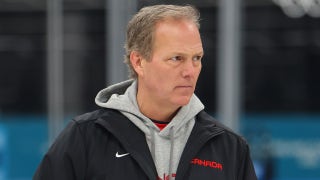SAN FRANCISCO – The record-setting U.S. Open winner. The Masters champion. The top-ranked player in the world.
Gone. Gone. Gone.
The Olympic Club clobbered Rory McIlroy, Bubba Watson and Luke Donald in two rounds at the U.S. Open, sending some of the most prominent players on the planet home before the weekend. All three missed the cut, looking more like amateurs at a local course than professionals in a major championship.
"Disappointed," said McIlroy, the second-ranked player who finished at 268 last year at Congressional to break the 72-hole record by four shots. "It wasn't the way I wanted to play."
Not even close.
World No. 1 Luke Donald finished at 11-over par, McIlroy 10 over and Watson 9 over. While 65 players were good enough to hang around at 8 over or better, the three stars were among 91 others not quite ready for "golf's toughest test."
So long, San Francisco.
"I felt a little uncomfortable," Donald said. "I felt I wasn't compressing the ball like I should have been. I didn't have quite the full control. In previous years, I probably would have panicked a little bit. But I tried to go out and just kind of trust it and even in the practice days I wasn't quite comfortable."
Feeling uneasy is exactly what organizers wanted.
That, and a smaller field on the weekend.
The USGA decided this year to eliminate the 10-shot rule in which players within 10 strokes of the lead make the cut. Starting at this year's championship, the cut was the top 60 and ties.
USGA executive director Mike Davis said the idea behind the new rule was to limit the number of players making the cut — 108 did so Oakland Hills in 1996 — and prevent slow play that could force a two-tee start in threesomes.
The flip side was 1993, when Ernie Els made the cut because of the 10-shot rule. He closed with 68-67 on the weekend to tie for seventh, which made him exempt for qualifying the following year. Els won that next year at Oakmont for the first of his three majors.
Watson, 2010 British Open champion Louis Oosthuizen and Dustin Johnson were among the notables who would've been spared this year. So would've Casey Martin and his cart, too.
"I haven't really looked at the leaderboard," said Phil Mickelson, whose second-round 71 put him at 7 over and safe. "I've been more on the cut line."
Donald came to the U.S. Open with six wins in the past 18 months, more than any other player. Last year, the 34-year-old Englishman pulled off an unprecedented feat by topping the money lists on both the PGA and European tours.
Now he'll probably miss the weekend for the third time in nine U.S. Open starts.
Donald followed his birdie-free 79 — which even 14-year-old qualifier Andy Zhang matched Thursday — with a less erratic second round. He had five bogeys and three birdies to card a 72, coming up empty in yet another major.
"That's the one part of my golfing resume in the last few years, especially, that I need to continually address and continually improve," Donald said. "I want to win one more than any of you guys know."
At least one person didn't care.
Donald was made a Member of the Order of the British Empire in the Queen Elizabeth II's birthday honors list released Saturday for spending almost a year at the top of golf's world ranking.
"Not sure the Queen will be watching," Donald joked earlier this week in response to a curious British reporter's question. "But who knows?"
Her Majesty won't have the chance.
The fast and fickle fairways some of the game's top players hacking out of rough and digging into sand for shots. Others searched for balls in the colossal cypress trees or pushed putts all over the rock-hard greens. Some did all of them.
The only thing more startling than the top-ranked player's early exit was last year's champion.
McIlroy mixed five bogeys — including one on his final hole — with a pair of birdies in the second round a day after he posted a 77. The 23-year-old from Northern Ireland shattered U.S. Open records last June at rain-softened Congressional, finishing at 268 to break the 72-hole record by four shots, and his 16-under total was four better than Woods' mark at Pebble Beach in 2000.
What a pushover that course look like now.
"It's just the course is so tough with the reverse cambers and you hit it in the middle of the fairway sometimes it doesn't hold and you're in the rough and when you hit it in the rough it makes it difficult,' McIlroy said about Olympic. "They set it up like a real classic U.S. Open."
___
Follow Antonio Gonzalez at: www.twitter.com/agonzalezAP








































